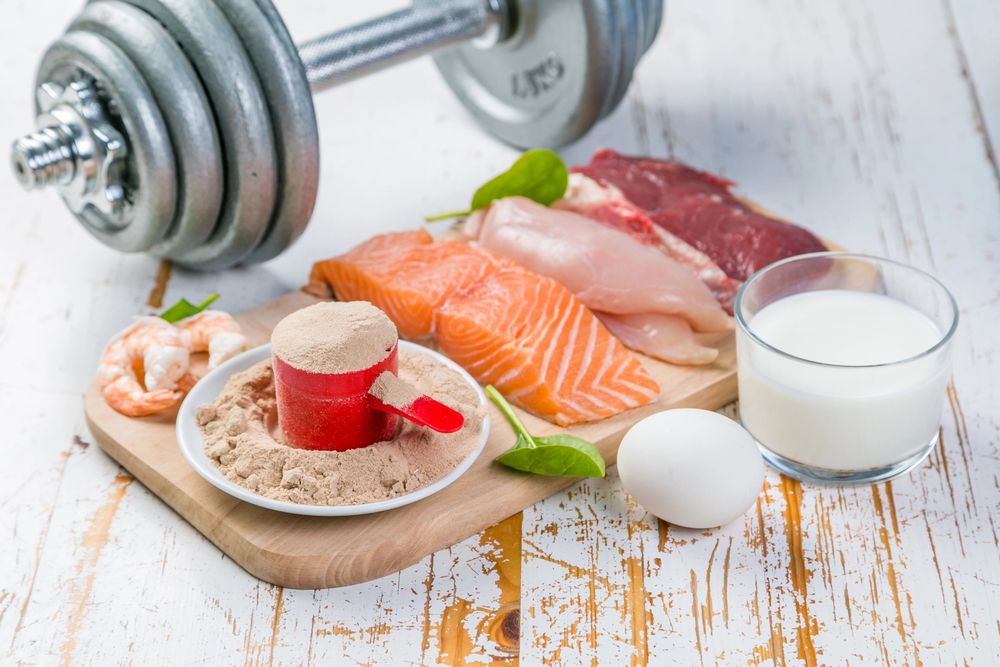
Protein is an essential nutrient for anyone, but its importance becomes much more significant in the sporting field. Precisely for this reason, if you want to know the protein intakes recommended, keep reading.
Why is protein so important in sports?
Regardless of your level of experience or age, consuming the right amount of protein is crucial for performance, recovery, and muscle growth. However, it is true that for people with regular physical activity, it is even more necessary.
The main reason is that protein plays a vital role in the repair and growth of muscle tissues. During exercise, especially intense workouts, muscle fibers tear. Protein helps repair these tears, which in turn allows for muscle growth and improved performance.
Additionally, protein contributes to production of essential enzymes and hormonesand provides a secondary energy source when carbohydrates are scarce.
Therefore, not only people focused on hypertrophy routines need this macronutrient. Anyone with a high level of exercise for their age may need it.
What protein intakes are the most appropriate?
If you want to know how much protein your diet should contain, we are going to tell you here.
The truth is that the amount of protein a person needs varies depending on factors such as body weight, type of exercise, and personal goals. For athletes, general recommendations are the following:
- Athletes beginners: 1.2 to 1.4 grams of protein per kilogram of body weight.
- intermediate: 1.4 to 1.6 grams of protein per kilogram of body weight.
- athletes advanced: 1.6 to 2.0 grams of protein per kilogram of body weight.
These recommendations can be adjusted depending on the type of sport and the intensity of the training. For example, bodybuilders and strength athletes may require a higher protein intake compared to long-distance runners.
And if you simply go to the gym to feel healthy and good about yourself, the quantity doesn’t have to be so exact.
Distribution of protein intake throughout the day
To maximize the benefits of protein, not only the total daily amount is important, but also how it is distributed throughout the day. This is where the number of protein intakes.
Beginner Athletes
For beginner athletes, who are in the early stages of their training, it is advisable to divide the daily protein intake into 3 to 4 main meals. This allows for more efficient absorption and utilization of the protein. For example, if a person needs 100 grams of protein a day, he can divide it into:
- Post-workout snack or snack: 25 grams.
This distribution helps maintain a constant supply of amino acids for recovery and muscle growth.
Intermediate Athletes
Intermediate athletes, who already have a solid training base, may benefit from a more frequent distribution of protein intake. In this case, it is recommended to consume protein every 3 to 4 hours, which is equivalent to 4 to 5 meals or snacks a day.
For example, a person who needs 120 grams of protein per day can distribute it like this:
- Mid-morning: 20 grams.
This strategy not only optimizes muscle protein synthesis, but also helps keep energy levels stable throughout the day.
Advanced Athletes
For advanced athletes, especially those who train intensely or are in a competition phase, more frequent protein intake may be beneficial. It is recommended to divide your daily protein intake into 5 to 6 meals or snacks.
This ensures a constant flow of amino acids for muscle recovery and growth. For example, if a person needs 150 grams of protein per day, they can divide it like this:
- Mid-morning: 20 grams.
Snack before bed: 20 grams
This distribution is ideal for those looking to maximize muscle hypertrophy and post-workout recovery.
Ultimately, the protein intakes and diet are important, yes, but it is more important to adapt it to your needs. If you have questions, contact our specialists who will advise you in the best way.






